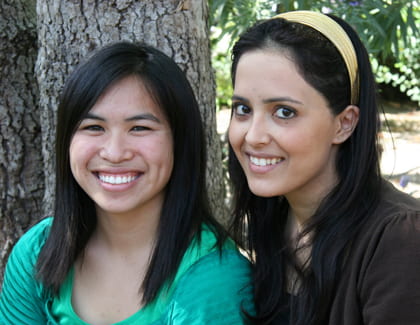Friends in need
Through the Peer Educator program, alumnae Maryam Sharifi and KC Bui help students cope with challenges of college life

As a former transfer student at UCI, Maryam Sharifi ’07 knows what it’s like to be overwhelmed by a big university.
“You can feel like a number,” she says. Sharifi found friends and a sense of belonging when she signed up for the UCI Counseling Center’s Peer Educator program, which trains students to provide educational outreach services to their peers. Being a Peer Educator proved so satisfying for Sharifi, she returned to campus after graduating to volunteer as one of the program’s associate coordinators. She wants to make sure other students don’t feel like a number.
Academic pressures, dealing with difficult roommates, juggling jobs and schoolwork, troubled relationships – students can face all kinds of emotional challenges during their college years.
“Students are prone to high levels of stress,” says Kenneth Caillet, Counseling Center psychologist and instructor/coordinator of the Peer Educator program, which he started 11 years ago. “We provide learning opportunities in which students acquire the information and skills that help them manage potentially stressful events. For example, areas such as assertiveness training and communication skills can lower students’ chances of interpersonal conflicts, and help them resolve them more quickly should they arise.”
During spring quarter, the Peer Educator program presents a series of “Friends Helping Friends” workshops that teach students to identify and support friends in trouble. Open to all UCI students, the free workshops are held 7-8:30 p.m. Tuesdays and Wednesdays through May 28 in the Balboa Island Room, Student Center. Topics include test anxiety, mediation skills and “Is My Friend Depressed?”
“We’re trying to target what most college students go through,” Sharifi says. Peer Educators also offer these workshops throughout the academic year in residence halls, departments, clubs and classrooms.
KC Bui ’07 became a Peer Educator while earning her bachelor’s in social science and working as a programmer and residents adviser for undergraduate student housing.
“I would explain the services of the counseling center and refer students who were having problems,” she says. “Students feel more comfortable coming to us first. As peers, we can reach out.”
Helping students inspired her to pursue a master’s in social work. Like Sharifi, she’s continued to volunteer for the program as one of the six associate coordinators who help train the 15 Peer Educators.
“The associate coordinators are all former Peer Educators and help run the program,” Caillet says. “They play a key role by providing leadership and serving as mentors to the Peer Educators.”
Peer Educators benefit from the program by gaining exposure to the counseling profession and skills such as public speaking and time management that “are important in any field,” Sharifi says. She earned a bachelor’s in psychology and works part-time at a law firm; she plans to apply to UCI Law School.
The peers don’t counsel students – they encourage those feeling overwhelmed by problems to go to the counseling center, where they can get eight free sessions with a professional.
“At one workshop, I had three students come up to me to make appointments with a counselor. That’s making a difference,” Sharifi says.